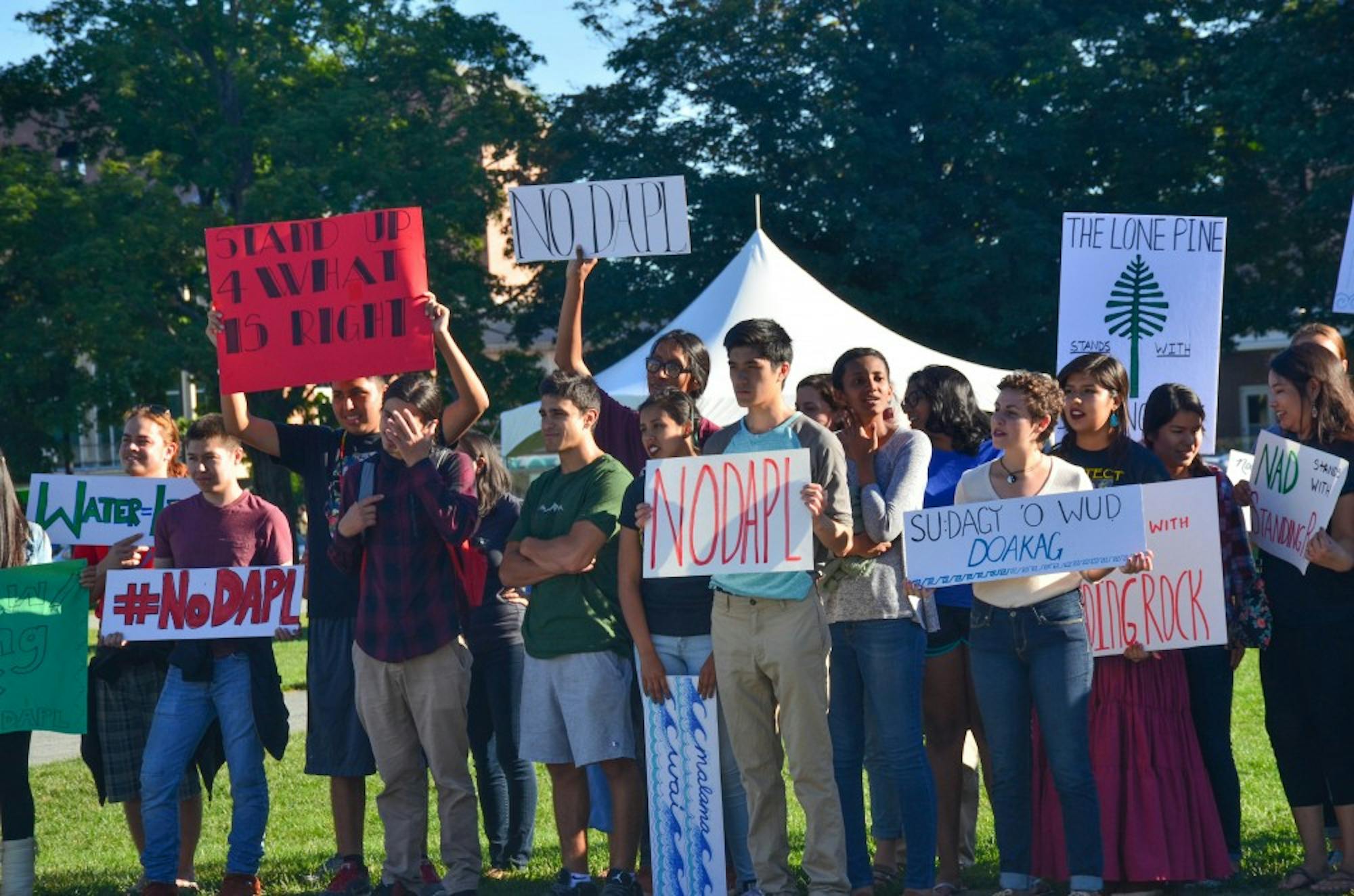Around 200 people gathered on the Green Friday afternoon to protest construction of the Dakota Access Pipeline on the Standing Rock Indian Reservation. Critics say the pipeline threatens to harm the water supply of many Native tribes while also cutting across their sacred lands and burial grounds.
Several Dartmouth students shared their stories about why they were opposing the pipeline. Charli Fool Bear-Vetter ’15 spoke about her family’s experiences dealing with the threat of contaminated water, something she said she can never forget. The DAPL does not care about such threats to the Missouri River, she said, criticizing the use of attack dogs and mace in Standing Rock against protesters.
Augusta Terkildsen ’19, who is from North Dakota, shared her experiences in Standing Rock this summer. She encouraged people to spread the word about the situation there and expressed gratitude that awareness about the DAPL has increased recently.
“We deserve to live too, just as much as anyone else,” she said.
Terkildsen spoke out against stereotypes of Native Americans as alcoholics, or the usage of statistical drinking rates to try and dismiss other Native health concerns. Several of her relatives in North Dakota who have never drank have still become sick, an outcome she blamed on water conditions there. She said she felt torn between her obligations as a student and to help her family and people.
Kalae Trask-Sharpe ’18, an indigenous Hawaiian student, discussed protests in Hawaii against the Thirty Meter Telescope, a proposed observatory that was intended to be built on lands considered sacred to Hawaiians. He talked about the importance of solidarity against such acts, including the DAPL.
The a cappella group the Rockapellas, of which Fool Bear-Vetter is a member, sang “Bury My Heart at Wounded Knee” and “Ella’s Song” at the rally.
The Rockapellas sing at the #rally for the #NorthDakotaPipeline #water #Dartmouth pic.twitter.com/34Beq56PJm
— The Dartmouth (@thedartmouth) September 16, 2016
In an interview after the event, Terkildsen said that she began planning the event a few weeks before she came back to campus, with most of the event coming together in the last two or three weeks. She said that she felt great about the turnout, and was pleased that the attendees were not only Native or people of color.
Moving forward, Terkildsen said she and other organizers will be working to raise money in support of Standing Rock. She directed those interested in learning more towards the Sacred Stone Facebook group.
More members of the community share their stories and feelings on #WaterIsLife and the #NorthDakotaPipeline pic.twitter.com/XuJ7W6bkUP
— The Dartmouth (@thedartmouth) September 16, 2016
Eliza Rockefeller ’17 said that she came to the rally because she supported what the Native students there were doing from both environmental and social justice perspectives. She described the people at the event as “lovely.”
Connor Gibson ’16 said that the DAPL is an important issue that everyone should support. While he was pleased with the level of turnout, he said that there could always stand to be more.
Emily Hardwell ’16, who was the president of the Native Americans at Dartmouth last year, said that she thought the rally had a good turnout, especially given how few Native students attend Dartmouth. She said the College itself should work to raise money in support of Standing Rock.
Divest Dartmouth, a group that advocates divesting from companies that extract fossil fuels, also joined the demonstration to show their solidarity with the NAD.
Megan Larkin ’19, who is an organizer for Divest Dartmouth, said that about 15 members from the group were present at the protest. She said Divest Dartmouth recognizes that the fossil fuel industry “not only contributes to climate change in the future, but also has [negative] impacts right now, such as building pipelines in Native communities.”
Larkin said that given the College’s status as a prominent institution, protests that occur on Dartmouth’s campus are more likely to receive national media coverage.
Hailey Jiang contributed reporting.




